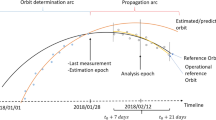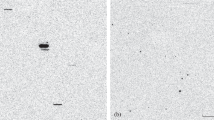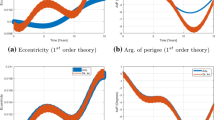Abstract
Due to the ever-increasing space objects population, space situational awareness products and services have become the cornerstone for the safety and sustainability of spacecraft operations. Most of these services rely on the characterization of the uncertainty of the system, which is known as uncertainty quantification. In many applications the uncertainty of the orbit state is represented by the covariance matrix, obtained from an orbit determination (OD) process. However, typical OD processes usually consider the measurements noise as the only source of uncertainty. An unrealistic characterisation of the uncertainty of dynamical and observations models leads to a degradation of the realism of the covariance, and jeopardizes spacecraft operations. In this work, we apply our recent methodology for covariance realism improvement, based on the consider parameter theory of batch least-squares methods, to a catalog scenario to derive the uncertainty of the atmospheric drag model. This methodology infers the variance of consider parameters based on the observed distribution of the Mahalanobis distances of the orbital differences between predicted and estimated orbits, which theoretically should follow a chi-square distribution under Gaussian assumptions. Empirical distribution function statistics such as the Cramer-von-Mises or the Kolmogorov-Smirnov distances are used to determine optimum variances of such parameters for covariance realism. The main objective of this work is to adapt and test the previously developed methodology to a LEO catalog scenario, in which the evolution of the density uncertainty for multiple objects can be analysed together by modelling such uncertainty as a consider parameter. Thus, instead of estimating the variances of the consider parameters tailored to a single object during a long period, the objective of this work is to determine variances of parameters of an parametric model for the atmospheric density uncertainty, improving the covariance realism for different clusters of cataloged objects (i.e. different altitudes or ballistic coefficient). Altitude-dependent models of the atmospheric density uncertainty, based on statistical analysis of historic space weather data, are applied for realistic simulations together with space-correlated density perturbations. Results are presented focusing on the physical interpretation of the determined consider parameter model variances and their effectiveness for improving the covariance realism of the considered catalog of objects.









Similar content being viewed by others
Data Availability
The data underlying this article will be shared on reasonable request to the corresponding author.
Code Availability
The code developed and used for the preparation of this manuscript is commercial software property of GMV.
References
Tapley, B.D., Schutz, B.E., Born, G.H.: Statistical Orbit Determination. Elsevier Academic Press, San Diego (2004)
Vallado, D.A.: Fundamentals of Astrodynamics and Applications, 4th edn. Springer, Hawthorne (1997)
Alfriend, K., Wilkins, M.: Covariance as an estimator of orbit prediction error growth in the presence of unknown sensor biases. Am. Astron. Soc. 103, 99–422 (2000)
Montenbruck, O., Gill, E.: Satellite Orbits: Models, Methods and Applications. Springer, Berlin (2000). https://doi.org/10.1007/978-3-642-58351-3
Poore, A.B., Aristoff, J.M., Horwood, J.T., Armellin, R., Cerven, W.T., Cheng, Y., Cox, C.M., Erwin, R.S., Frisbee, J.H., Hejduk, M.D., Jones, B.A., Di Lizia, P., Scheeres, D.J., Vallado, D.A., Weisman, R.M.: Covariance and Uncertainty Realism in Space Surveillance and Tracking. Numerica Corporation, Fort Collins (2016)
Wilkins, M., Alfriend, K.: Characterizing orbit uncertainty due to atmospheric uncertainty. In: Astrodynamics Specialist Conference. American Institute of Aeronautics and Astronautics, Denver. AIAA 2000-3931 (2000). https://doi.org/10.2514/6.2000-3931
Sagnieres, L., Sharf, I.: Uncertainty characterization of atmospheric density models for orbit prediction of space debris. In: Proceedings of the 7th European Conference on Space Debris. ESA Space Debris Office, Darmstadt, Germany (2017)
Duncan, M., Long, A.: Realistic covariance prediction for the earth science constellation. In: AIAA/AAS Astrodynamics Specialist Conference and Exhibit. American Institute of Aeronautics and Astronautics, Reston. AIAA 2006-6293 (2006). https://doi.org/10.2514/6.2006-6293
Schubert, M., Kebschull, C., Horstmann, S.: Analysis of different process noise models in typical orbitdetermination scenarios. In: 8th European Conference on Space Debris, vol. 8. ESA Space Debris Office, Darmstadt, Germany (2021). https://conference.sdo.esoc.esa.int/proceedings/sdc8/paper/82/
Schiemenz, F., Utzmann, J., Kayal, H.: Least squares orbit estimation including atmospheric density uncertainty consideration. Adv. Space Res. 63(12), 3916–3935 (2019). https://doi.org/10.1016/j.asr.2019.02.039
Frisbee, J.H.: An empirical state error covariance matrix for weighted least squares estimation method. NASA Johnson Space Center, Houston (2011)
Cerven, W.T.: Covariance error assessment, correction, and impact on probability of collision. In: Advances in the Astronautical Sciences, vol. 140, pp. 757–772. Univelt, San Diego (2011)
Cerven, W.T.: Improved empirical covariance estimation. Adv. Astronaut. Sci. 150, 879–895 (2014)
Zanetti, R., D’Souza, C.: Recursive implementations of the Schmidt-Kalman ‘consider’ filter. J. Astronaut. Sci. 60, 672–685 (2013). https://doi.org/10.1007/s40295-015-0068-7
Jazwinski, A.: Stochastic Processes and Filtering Theory. Academic Press, New York (1970)
Junkins, J.L., Akella, M.R., Alfriend, K.T.: Non-gaussian error propagation in orbital mechanics. J. Astronaut. Sci. 44, 541–563 (1996)
Vallado, D.A., Alfano, S.: Curvilinear coordinates for covariance and relative motion operations. In: AAS/AIAA Astrodynamics Specialist Conference. AAS 11-464 (2011)
Laurens, S., Dolado, J., Cavallaro, G., Jouisse, M., Seimandi, P.: Towards the maintenance of gaussianity on state vector uncertainty propagation. In: 69th International Astronautical Congress, 42351 (2018). https://iafastro.directory/iac/paper/id/42351/summary/
Folcik, Z., Lue, A., Vatsky, J.: Reconciling covariances with reliable orbital uncertainty. In: Advanced Maui Optical and Space Surveillance Technologies Conference (2011)
Laurens, S., Seimandi, P., Couetdic, J., Dolado, J.: Covariance matrix uncertainty analysis and correction. In: 68th International Astronautical Congress, 37415 (2017). https://iafastro.directory/iac/paper/id/37415/summary/
Cano, A., Pastor, A., Escobar, D., Míguez, J., Sanjurjo-Rivo, M.: Covariance determination for improving uncertainty realism in orbit determination and propagation. Adv. Space Res. 72(7), 2759–2777 (2023). https://doi.org/10.1016/j.asr.2022.08.001
Cano, A., Pastor, A., Fernández, S., Míguez, J., Sanjurjo-Rivo, M., Escobar, D.: Improving orbital uncertainty realism through covariance determination in geo. J. Astronaut. Sci. 69, 1394–1420. https://doi.org/10.1007/s40295-022-00343-x
Cano, A., Pastor, A., Escobar, D.: Covariance determination for improving uncertainty realism. In: 8th European Conference on Space Debris. ESA Space Debris Office, Darmstadt, Germany, 224 (2021). https://conference.sdo.esoc.esa.int/proceedings/sdc8/paper/224/
Vallado, D.A., Kelso, T.S.: Earth orientation parameter and space weather data for flight operations. In: Advances in the Astronautical Sciences, vol. 148. AAS 13-373 (2013)
International Reference Atmosphere COSPAR: Models of the earth’s upper atmosphere. Technical report, Committee on Space research (COSPAR) International Reference Atmosphere (2012)
Gondelach, D.J., Linares, R.: Atmospheric Density Uncertainty Quantification for Satellite Conjunction Assessment. AIAA, Reston. AIAA 2020-0232 (2020). https://doi.org/10.2514/6.2020-0232
Emmert, J.T., Warren, H.P., Segerman, A.M., Byers, J.M., Picone, J.M.: Propagation of atmospheric density errors to satellite orbits. Adv. Space Res. 59(1), 147–165 (2017). https://doi.org/10.1016/j.asr.2016.07.036
Marcos, F.A., Lai, S.T., Huang, C.Y., Lin, C.S., Retterer, J.M., Delay, S.H., Sutton, E.: Towards next level satellite drag modeling. In: AIAA Guidance, Navigation, and Control Conference. AIAA 2010-7840 (2010)
Leonard, J.M., Forbes, J.M., Born, G.H.: Impact of tidal density variability on orbital and reentry predictions. Space Weather 10, S12003. https://doi.org/10.1029/2012SW000842
Aguado, J.B., Santiago, J.L., Yela, A.L., Olmos, P.M., Arenas, J.M., Gonzalez, D.M., Rivo, M.S., Lopez, M.V., Cano, A., Escobar, D., Bonay, E.V., Padreny, P.G., Virgili, B.B., Lemmens, S., Merz, K., Siminski., J.: Uncertainty propagation meeting space debris needs. In: 8th European Conference on Space Debris. (2021). https://conference.sdo.esoc.esa.int/proceedings/sdc8/paper/253/
Cano, A., Gago, P., Pastor, A., Santiago, J.L., Sanjurjo-Rivo, M., Míguez, J., Escobar, D.: Atmospheric correlation impact in uncertainty propagation. In: 3rd International Conference on Space Situational Awareness (ICSSA). ICSSA, Daytona Beach (2022)
Michael, J.R.: The stabilized probability plot. Biometrika 70(1), 11–17 (1983). https://doi.org/10.1093/biomet/70.1.11
Royston, P.: Graphical detection of non-normality by using Michael’s statistic. Appl. Stat. 42(1), 153 (1993). https://doi.org/10.2307/2347417
Mahalanobis, P.: On the generalised distance in statistics. Proc. Indian Natl. Sci. Acad. 2, 49–55 (1936)
Hill, K., Sabol, C., Alfriend, K.T.: Comparison of covariance based track association approaches using simulated radar data. J. Astronaut. Sci. 59(1–2), 281–300 (2012). https://doi.org/10.1007/s40295-013-0018-1
D’Agostino, R.B., Stephens, M.A.: Goodness-of-fit techniques. Statistics: Textbooks and Monographs, vol. 68. Marcel Dekker Inc, New York (1986)
Kelso, T.: Celestrack SATCAT. https://celestrak.com (2020). Accessed 22 Jan 2020
Brockwell, P.J., Davis, R.A.: Introduction to Time Series and Forecasting, 3rd edn. Springer, Cham (2016). https://doi.org/10.1007/978-3-319-29854-2
18th Space Control Squadron: Space-Track. https://www.space-track.org (2020). Accessed 12 Feb 2020
Vallado, D.A., Seago, J.H.: Covariance realism. In: AAS/AIAA Astrodynamics Specialist Conference. AAS 09-304 (2009)
Wiesel, W.E.: Modern Orbit Determination. Aphelion Press, Beavercreek (2003)
Acknowledgements
This project has received funding from the “Comunidad de Madrid” under “Ayudas destinadas a la realización de doctorados industriales" program (project IND2020/TIC-17539), and from Agencia Estatal de Investigación of Spain (project PID2021-125159NB-I00 TYCHE).
Author information
Authors and Affiliations
Corresponding author
Ethics declarations
Conflict of interest
The authors declare that they have no known competing financial interests or personal relationships that could have appeared to influence the work reported in this paper.
Additional information
Publisher’s Note
Springer Nature remains neutral with regard to jurisdictional claims in published maps and institutional affiliations.
Rights and permissions
Springer Nature or its licensor (e.g. a society or other partner) holds exclusive rights to this article under a publishing agreement with the author(s) or other rightsholder(s); author self-archiving of the accepted manuscript version of this article is solely governed by the terms of such publishing agreement and applicable law.
About this article
Cite this article
Cano, A., Pastor, A., Míguez, J. et al. Catalog-Based Atmosphere Uncertainty Quantification. J Astronaut Sci 70, 42 (2023). https://doi.org/10.1007/s40295-023-00403-w
Accepted:
Published:
DOI: https://doi.org/10.1007/s40295-023-00403-w




